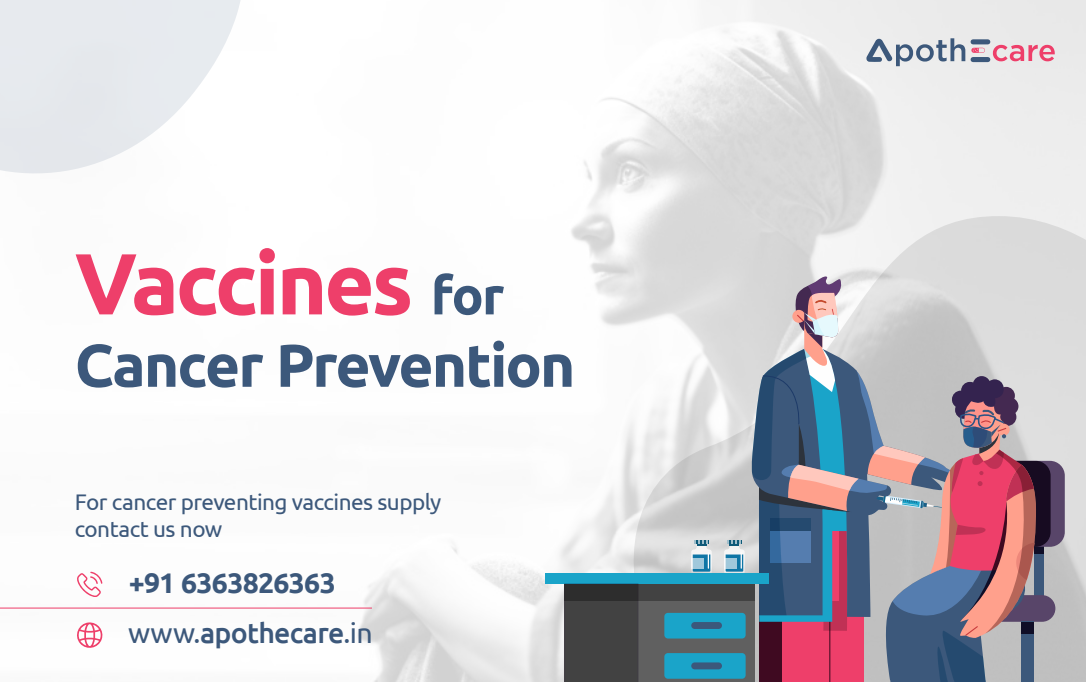
Understanding Cancer Vaccines: Types, Benefits & Availability in India
Cancer remains one of the top causes of mortality globally, affecting millions of individuals each year. Prevention is still the most effective strategy, even though lifestyle modifications, early detection, and cutting-edge treatments have helped lower the incidence of cancer and increase survival. Vaccination is one of the best, but least used, preventative strategies. Some vaccines offer an affordable yet potentially life-saving way to shield the body from infections that might cause cancer. Vaccinations designed solely to prevent cancer (Prophylactic cancer vaccines). There are mainly 2 types of cancer vaccines.
1. Preventive Cancer Vaccines
2. Therapeutic Cancer Vaccines
How Vaccines are used to treat Cancer:
Vaccines used to treat cancer are called therapeutic cancer vaccines. They are designed to stimulate the immune system to combat an existing illness rather than avoiding it.
Cancer vaccinations that are therapeutic can function by:
· Preventing the recurrence of cancer.
· Destroying any remaining cancer cells in the body following the completion of treatment.
· Preventing the growth or spread of a tumor.
With the use of therapeutic cancer vaccines, the immune system is trained to recognize and target cancer cells that exhibit specific antigens. The vaccination may continue to function long after it is administered because the immune system may recall these signals.
1. Preventive Cancer Vaccines:
Many malignancies originate as a result of viral infections, and vaccinations that prevent these infections are crucial in lowering risk. For example, the hepatitis B virus, or HBV, can cause liver cancer, while the human papillomavirus, or HPV, can cause cervical and head and neck cancer. Numerous vaccinations have been created that can stop HPV and HBV infections, hence preventing the development of malignancies linked to HPV and HBV.
a. Human Papillomavirus (HPV) Vaccine:
What is HPV?
- HPV is a group of over 100 viruses.
- Certain high-risk types (especially HPV 16 & 18) are responsible for over 70% of cervical cancers.
Cancers of the anus, vulva, vagina, penis, and oropharynx (the area of the throat and tonsils) are also brought on by HPV.
How the HPV Vaccine Works?
- It contains virus-like particles (VLPs) that mimic the outer shell of HPV but contain no genetic material—so they cannot cause infection.
- These VLPs stimulate a strong immune response and provide long-term protection.
Who can receive the HPV Vaccine?
· The HPV vaccine can be administered as early as age 9, although it is advised for preteens ages 11 to 12.
· Everyone up to the age of 26 who hasn't had the HPV vaccine already is advised to do so.
· It is not advised that anyone over 26 get vaccinated against HPV. However, after discussing their risk for new HPV infections and the potential advantages of vaccination with their doctor, some adults between the ages of 27 and 45 who have not previously received the HPV vaccine may choose to do so. People in this age group are more likely to have been exposed to HPV, hence the benefits of HPV vaccine are lower.
Types of HPV Vaccine:
|
Vaccine Name |
HPV Types Covered |
Manufacturer |
Cancer Prevention |
|
Gardasil-4 |
HPV 6, 11, 16, 18 |
Merck |
Cervical, vaginal, vulvar, anal, genital warts |
|
Gardasil-9 |
HPV 6, 11, 16, 18, 31, 33, 45, 52, 58 |
Merck |
Broader protection from additional cancer-causing HPV types |
|
Cervarix |
HPV 16, 18 |
GlaxoSmithKline (GSK) |
Cervical cancer (only) |
b. Hepatitis B Vaccine:
What is HBV?
- Hepatitis B virus (HBV) is a major risk factor for liver cancer (hepatocellular carcinoma).
- Chronic HBV infection leads to liver cirrhosis and cancer.
How the HBV Vaccine Works:
- Contains recombinant HBsAg (Hepatitis B surface antigen).
- Stimulates the immune system to produce anti-HBs antibodies, giving long-term protection.
Who can receive the HBV Vaccine?
All ages should get the Hepatitis B (HBV) vaccine, although higher-risk groups should get it more frequently. The following people ought to receive the HBV vaccine:
· All newborns (first dosage at delivery, then the entire course).
· Young children and adolescents who weren't previously immunized.
· All adults who have not previously received vaccinations.
Common HBV Vaccines:
|
Brand Name |
Form |
Type |
|
Engerix-B |
Monovalent |
Adult/children |
|
Recombivax HB |
Monovalent |
Adult/children |
|
Hexaxim, Pentavac |
Combination vaccines (includes HBV + DTP + Hib + IPV) |
For infants |
2. Therapeutic Cancer Vaccines:
Therapeutic cancer vaccines teach the immune system to identify and combat aberrant cancer cells, thereby treating cancer after it has already developed. They function by exposing the body to antigens unique to cancer, frequently in conjunction with an adjuvant to strengthen the immune system. These vaccinations have the ability to stop tumor development or spread, eliminate cancer cells that remain after radiation or surgery, and stop cancer from returning. In cancer immunotherapy, they present a promising strategy by strengthening the body's defenses.
Types of Therapeutic Cancer Vaccines:
The US Food and Drug Administration has approved several therapeutic cancer vaccines. These consist of:
a. Sipuleucel-T (Provenge): It is used to treat advanced prostate cancer that no longer responds to hormone therapy. In order to create this vaccine, white blood cells, or immune cells, are extracted from your blood, combined with a protein from prostate cancer cells, and then reinfused into your vein (IV).
The procedure is carried out three times in total. After that, the cells aid in the immune system's assault on the prostate cancer cells. Some people may live longer even if it hasn't been proven to cure cancer.
b. Nadofaragene firadenovec (Adstiladrin): It is a gene therapy that functions similarly to a cancer vaccination to treat early-stage bladder tumors that have progressed following BCG therapy. A gene that encourages bladder cells to create interferon alfa-2b, a protein that aids the immune system in attacking cancer cells, is delivered by a virus. It is administered directly into the bladder by intravesical infusion, just like BCG.
c. Bacillus Calmette-Guerin (BCG): It is used to treat early bladder cancer. It is made from bacteria similar to those that cause tuberculosis, but it does not make people sick. It is administered intravenously into the bladder, where it triggers the immune system to target the cancerous cells there.
d. T-VEC (Imlygic®): This vaccine, which is based on an oncolytic virus, is used to treat metastatic melanoma that surgery cannot fully eradicate. It is composed of a genetically altered virus that stimulates an immune response against cancer.
Side Effects:
Depending on the type of vaccine administered, side effects from cancer vaccinations vary from person to person. Typical side effects include:
· Anorexia
· Back pain
· Chills
· Fatigue
· Fever
· Flu-like symptoms
· Headache
· Joint Pain
· Myalgia
· Nausea
Conclusion:
Vaccines are increasingly effective instruments in the battle against cancer and are no longer just used to prevent infectious diseases. The effectiveness of the Hepatitis B and HPV vaccines demonstrates how vaccination can significantly lower the global cancer burden. Vaccines may contribute to a future free of cancer if awareness, accessibility, and research are maintained.
In order to prevent cancer, protection is the first step, and vaccinations are important to this effort.
FAQs:
1. What are cancer vaccines?
vaccinations against viruses or infections that can cause cancer are known as cancer prevention vaccinations. They reduce the chance of getting some cancers by avoiding these illnesses.
2. Are vaccines for cancer prevention safe?
Indeed. Vaccines against HPV and Hepatitis B have been thoroughly investigated and found to be safe. Serious adverse effects are extremely uncommon, but mild ones like injection site soreness, fever, or exhaustion are possible.
3. Do these vaccines cure cancer that already exists?
No. Since these vaccinations are preventative, they are most effective prior to viral exposure. They are unable to cure malignancies linked to HPV or HBV infections that are already present.
4. Are there any new vaccines being developed to prevent cancer?
Yes. Epstein-Barr virus (EBV), Helicobacter pylori, and therapeutic cancer vaccines that can cure pre-existing malignancies including lung and melanoma are among the vaccines that researchers are developing.
5. Why is it vital to raise awareness about cancer vaccines?
A lot of individuals don't know that infections can lead to cancer. Raising awareness guarantees that more individuals receive vaccinations, which can drastically lower the incidence of cancer worldwide.
Vaccines = Protection + Prevention
Raising Awareness = Step Toward a cancer-free Future
References:
1. https://www.cancer.org/cancer/managing-cancer/treatment-types/immunotherapy/cancer-vaccines.html
3. https://www.cancerresearch.org/immunotherapy-by-treatment-types/cancer-vaccines
4. https://www.cdc.gov/cancer/prevention/vaccination.html
5.https://www.mayoclinic.org/diseases-conditions/hpv-infection/in-depth/hpv-vaccine/art-20047292





